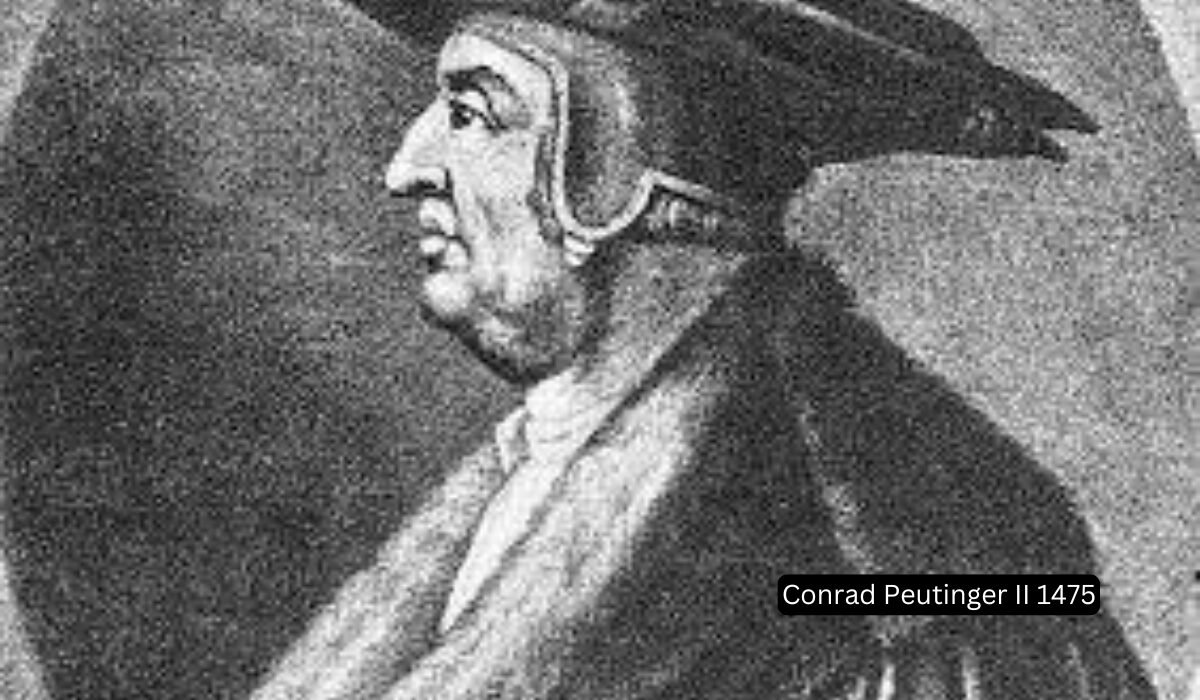Introduction
Conrad Peutinger ii 1475 In an era frequently overshadowed by large-than-life figures like Leonardo da Vinci and Christopher Columbus, the story of Conrad Peutinger II stands as a fascinating narrative of mind and innovation. Born in 1475, Peutinger became a first-rate Renaissance determiner who left an indelible mark on statistics, yet his contributions regularly remain underappreciated. This weblog positioned up explores the lifestyles and legacy of Conrad Peutinger II, imparting a charming glimpse into his achievements and their relevance to his time and ours.
Peutinger’s Formative Years
Conrad Peutinger was born in Augsburg, Germany, for a great intellectual ferment. The town of Augsburg itself was a melting pot of tradition and commerce, presenting an excellent backdrop for Peutinger’s early training. His upbringing turned steeped in humanist beliefs that had been flourishing at some stage in Europe at the time, and these formative years imbued in him a love for gaining knowledge of and an eager hobby within the classical world.
Peutinger’s schooling became comprehensive, covering subjects from law to the liberal arts. This broad academic background laid the foundation for his later achievements in numerous fields, including politics, cartography, and scholarship. His exposure to multiple disciplines enabled him to approach issues from a multidisciplinary angle, a hallmark of Renaissance questioning.
The twelve months of 1475 marked a pivotal moment in records because the Renaissance continued to spread its effect. Peutinger’s travel during this era placed him at the heart of a cultural and highbrow revolution that might form his lifestyle paintings. His consciousness of the transferring tides of knowledge and discovery influenced him to contribute actively to the Renaissance movement.
Political Engagement and Influence
Peutinger’s political career began in Augsburg’s city council, where he quickly emerged as a good parent. His ability to mediate conflicts and his self-control over civic responsibility earned him the respect of his friends. Peutinger’s position within the political sphere extended beyond local governance, as he engaged with broader European affairs, contributing to diplomatic missions and fostering cross-cultural exchanges.
Throughout his political career, Peutinger championed humanist ideals. He encouraged training reform, emphasizing the importance of a well-rounded curriculum that encompassed classical studies. His efforts to sell humanist values inside government establishments were instrumental in shaping the intellectual landscape of his time.
Peutinger’s political effect was no longer confined to his lifetime. His writings on governance and civic responsibility endured to inspire future generations of leaders. His vision of a society guided by the valuable resources of cause and schooling resonates even today, underscoring the iconic effect of his mind on political thought.
The Peutinger Table, a Cartographic Marvel
One of Conrad Peutinger’s most famed contributions is the Peutinger Table, a Roman street map that gives a completely unique glimpse into the ancient world. The desk isn’t a conventional map but instead a schematic instance of the Roman Empire’s sizeable network of roads. Its significance lies in its functionality to hold geographical records in a manner that became available to travelers of the time.
The Peutinger Table is a testament to Peutinger’s dedication to preserving understanding. He recognized the price of historical cartographic facts and took it upon himself to ensure their survival. The desk’s protection allowed destiny generations to discover and apprehend the Roman Empire’s expanse and infrastructure.
The Peutinger Table’s effect extends past its historical context. It continues to be a precious aid for researchers and historians, providing insights into the movement of people and items within the ancient world. Peutinger’s efforts to defend this cartographic surprise have enriched our knowledge of records and geography.
Peutinger’s Scholarly Endeavors
Peutinger was no longer a politician and cartographer but a prolific pupil. His writings covered a wide range of topics, from classical literature to criminal treatises. His scholarly paintings meditated on his dedication to advancing facts and fostering intellectual interest.
Central to Peutinger’s scholarship is his determination to the study of antiquity. He believed that knowledge of the past became important for improvement in the present. His meticulous research into classical texts and artifacts contributed to the revival of historical statistics at a few levels in the Renaissance, bridging the space between past and present.
Peutinger’s scholarly achievements were recognized by the usage of his peers, which gave him an area in the intellectual circles of his time. His impact extended to universities and think tanks, wherein his thoughts stimulated new generations of students to discover the intersections of records, philosophy, and technology.
A Legacy of Humanism
Conrad Peutinger’s unwavering willpower toward humanism was central to his existence and work. He believed in the power of education to uplift people and societies and dedicated his efforts to spreading humanist ideals. His advocacy for combining classical research into training systems left a long-lasting effect on educational institutions.
Peutinger’s legacy as a humanist transcends his technology. His emphasis on critical thinking, empathy, and cultural exchange resonates with current values. In an international that continues to grapple with demanding situations related to diversity and data, Peutinger’s vision of a harmonious, knowledgeable society remains as applicable as ever.
Through his writings, Peutinger sought to create a bridge between past and present, encouraging future generations to investigate from records while forging new paths. His enduring legacy serves as a reminder of the importance of expertise, compassion, and collaboration in building a better international.
Peutinger’s Enduring Relevance
Conrad Peutinger’s contributions continue to be significant in the present-day world. In an age where information is abundant but regularly fragmented, his interdisciplinary approach to information remains a guiding principle. His capacity to connect reputedly disparate fields of study evokes present-day thinkers to discover new avenues of expertise.
Peutinger’s impact is particularly relevant in present-day globalized society. His commitment to fostering communication amongst cultures and his efforts to keep ancient focus function as a model for addressing present-day worrying situations related to variety and inclusion. His legacy encourages us to seek commonplace ground and have a great time sharing values.
The instructions we will study from Peutinger’s existence are manifold. His strength of will to training, diplomacy, and the maintenance of understanding underscores the significance of these principles in shaping a brighter future. Peutinger’s enduring relevance demands that we reconsider the processes in which we interact with information and use it to tell our gift moves.
Peutinger’s Impact on Modern Education
Conrad Peutinger’s legacy extends to the location of training, where his thoughts shape coaching and learning practices. His advocacy for a comprehensive curriculum that includes every classical and modern-day research has inspired academic establishments worldwide.
Peutinger’s emphasis on vital thinking and analytical talents forms the muse of modern-day training. His perception of the value of numerous views encourages educators to domesticate environments wherein college students can discover a wide range of disciplines. This holistic approach to training prepares people to thrive in an interconnected world.
The impact of Peutinger’s educational philosophy is evident in the upward push of interdisciplinary studies. His vision of bridging the distance among brilliant data fields has precipitated the improvement of applications, encouraging university college students to explore the intersections of technology and the humanities. Peutinger’s legacy reminds us that real getting to know occurs when we connect disparate thoughts to gain more profound information about the arena.
Peutinger’s Lasting Influence on Diplomacy
Beyond schooling, Conrad Peutinger’s contributions to diplomacy resonate in contemporary worldwide relations. His dedication to fostering communication and information amongst several cultures serves as a version of diplomatic efforts in state-of-the-art interconnected worldwide.
Peutinger’s diplomatic endeavors emphasized the significance of empathy and cross-cultural communication. His capability to mediate conflicts and construct bridges among nations remains a concept for diplomats and leaders searching for nonviolent resolutions to worldwide worrying situations.
The legacy of Peutinger’s global relations is apparent in the upward push of global groups committed to promoting cooperation and warfare selection. His standards of international relations remind us of the power of collaboration and negotiation in fostering a more harmonious international. Peutingers challenge us to prioritize speaking and mutual expertise in addressing complex global problems.
Peutinger’s Role in Cultural Preservation
Conrad Peutinger’s willpower for cultural preservation is another component of his legacy that continues to affect the world. His efforts to shield historical texts and artifacts laid the basis for maintaining cultural history for future generations.
Peutinger’s willpower to maintain the beyond reminds us of the importance of cultural history in shaping our identities. His artwork highlights the desire to guard and have a terrific time with the diverse histories and traditions that grow our global society.
The legacy of Peutinger’s cultural maintenance efforts is evident inside the arena’s status quo of museums, libraries, and cultural institutions. His vision of safeguarding records and history encourages us to rate the treasures of our past and skip them immediately to future generations. Peutinger’s contributions mission us to recognize the significance of cultural preservation in promoting past-cultural understanding and team spirit.
Peutinger’s Enduring Legacy
Conrad Peutinger’s existence and paintings leave an enduring legacy that continues to encourage and affect generations. His contributions to politics, scholarship, international relations, training, and cultural preservation underscore the breadth of his effect on society.
Peutinger’s legacy reminds us of the importance of interdisciplinary questioning, humanist values, and a dedication to the pursuit of know-how. His imagination and pretentiousness for a harmonious and knowledgeable society serve as a guiding light for individuals and establishments striving to create excellent global exchanges.
As we mirror the life of Conrad Peutinger, we’re reminded of the capability of people to head away a long-lasting mark on information. His unwavering strength of mind for the betterment of society worries us not to forget how we can contribute to improving our companies and the arena at large.
Conclusion
Conrad Peutinger II, 1475, emerges as a beacon of intellectual interest and innovation in the annals of records. His multifaceted contributions to politics, cartography, scholarship, and international members of the family reveal the electricity of interdisciplinary thinking and humanist values. Peutinger’s enduring legacy challenges us to reimagine the tactics in which we engage with the beyond, gift, and destiny.
Peutinger’s existence serves as a testament to people’s tremendous ability to shape history. His dedication to education, cultural upkeep, and global relations offers precious training for navigating the complexities of our modern-day world. Peutinger’s story makes us grow to be active members in the ongoing quest for information, facts, and outstanding change.
As we pay tribute to Conrad Peutinger’s legacy, we’re reminded of the timeless significance of curiosity, compassion, and collaboration. His contributions resonate across disciplines and generations, underscoring the long-lasting relevance of his thoughts. Peutinger’s legacy invites us to continue pursuing statistics and innovation, jogging collectively to build a brighter and more harmonious future.

